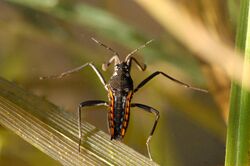Biology:Velia caprai
| Velia caprai | |
|---|---|

| |
| Scientific classification | |
| Domain: | Eukaryota |
| Kingdom: | Animalia |
| Phylum: | Arthropoda |
| Class: | Insecta |
| Order: | Hemiptera |
| Suborder: | Heteroptera |
| Family: | Veliidae |
| Genus: | Velia |
| Species: | V. caprai
|
| Binomial name | |
| Velia caprai (Tamanini, 1947)
| |
Velia caprai, known as the water cricket, is a species of aquatic bug found in Europe. It grows to a length of 8.5 mm (0.33 in) and is stouter than pond skaters of the family Gerridae. It is distasteful to predatory fish, engages in kleptoparasitism, and can travel at twice its normal speed by spitting on the water surface.
Description
The adult insect grows to a length of 6.2–8.5 millimetres (0.24–0.33 in).[1] Members of the family Veliidae resemble the pond skaters of the family Gerridae, but with stouter middle and hind legs, and a generally stouter appearance.[2]
Ecology
Velia caprai has a chemical defence mechanism which is often able to prevent predation. It is so distasteful to brown trout (Salmo trutta) that the fish will spit out any Velia caprai it takes without causing them any damage.[3]
Behaviour
Velia caprai is subject to kleptoparasitism. In one study, whenever it took prey heavier than 7.9 grams (0.28 oz), other bugs of the same species joined it and successfully ate parts of the prey.[4]
One unusual behaviour exhibited by Velia caprai is called "expansion skating", or Entspannungschwimmen (German for "relaxation swimming"), in which saliva is ejected from the insect's beak onto the surface of the water, lowering the surface tension and allowing the insect to travel at up to twice its normal speed.[3]
Velia caprai aligns itself to the plane of polarised light, although the reasons for this behaviour are not clear.[5]
Taxonomic history
Velia caprai was first described as a separate species by Livio Tamanini in 1947, in a monographic revision of the genus Velia. Formerly, V. caprai and other species, such as V. saulii, were included in Velia currens (Fabricius, 1794).[6]
References
| Wikimedia Commons has media related to Velia caprai. |
- ↑ Jim Lindsey. "Velia caprai Tamanini 1947 (Family Veliidae)". Ecology of Commanster. http://www.commanster.eu/commanster/Insects/Bugs/WBugs/Velia.caprai.html.
- ↑ Michael Chinery (1993). "Amphibicoriscae: pond skaters and other surface-living water bugs". Insects of Britain and Northern Europe. Collins Field Guides (3rd ed.). HarperCollins. pp. 111–112. ISBN 0-00-219918-1.
- ↑ 3.0 3.1 James T. Costa (2006). "Aquatic bugs". The other insect societies. Belknap Press Series. Harvard University Press. pp. 336–363. ISBN 978-0-674-02163-1. https://books.google.com/books?id=PYRFDrZs9QAC.
- ↑ Ann Erlandsson (1988). "Food sharing vs monopolising prey: a form of kleptoparasitism in Velia caprai (Heteroptera)". Oikos 53: 203–206. doi:10.2307/3566063.
- ↑ Gábor Horváth & Dezsö Varjú (2004). "Velia caprai". Polarized light in animal vision: polarization patterns in nature. Springer. pp. 180. ISBN 978-3-540-40457-6. https://books.google.com/books?id=jkwvub-1zy8C.
- ↑ Sheila Brooke (2004). "A checklist of British water bugs (Hemiptera–Heteroptera)" (PDF). Het News 3. http://www.hetnews.org.uk/pdfs/Issue%203_Spring%202004_422Kb.pdf.
Wikidata ☰ Q1030757 entry
 |

